|
|
|
Sort Order |
|
|
|
Items / Page
|
|
|
|
|
|
|
| Srl | Item |
| 1 |
ID:
123985
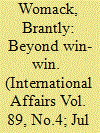

|
|
|
|
|
| Publication |
2013.
|
| Summary/Abstract |
China is the least disadvantaged major economy in the current era of global economic uncertainty. Thus it is becoming the focus of attention of its neighbours and is achieving a prominence in the world political economy unparalleled in its modern history.
To a great extent, China's success is the result of 'good neighbour diplomacy' such as 'win-win' and the policies of reform and openness of the past thirty years. However, despite continuity in policy, China's 'peaceful leap forward' since 2008 has changed the context of its external relationships. The increasing asymmetries between China and its neighbours, as well as decreasing asymmetry with the United States, require an adjustment of win-win values beyond mutual benefit to credible reassurance.
As China's neighbours become more dependent, they also become more anxious concerning their interests. Meanwhile, China's relative gain on the US requires a different kind of confidence-building diplomacy.
|
|
|
|
|
|
|
|
|
|
|
|
|
|
|
|
| 2 |
ID:
123986
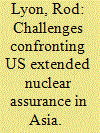

|
|
|
|
|
| Publication |
2013.
|
| Summary/Abstract |
This article aims to explore the credibility of future US extended nuclear assurance in Asia.
Extended nuclear assurance, all too frequently confused with extended nuclear deterrence, faces a daunting series of challenges: a US strategic mainstream fractured on the roles and purposes of nuclear weapons; an Asia where assurance demands are high during a period of strategic uncertainty; and a US theatre- and tactical-range nuclear arsenal much depleted from its heyday. Meanwhile, nuclear latency is growing in Asia as more countries reach the technological level that the US attained in 1945, as nuclear skill sets become more prevalent, and as delivery vehicles appropriate to nuclear weapons become more typical in regional arsenals.
The US now provides extended nuclear assurance to nearly 40 countries worldwide, agreeing to run nuclear risks on behalf of its allies and friends. The bulk of those assurances derive from the NATO alliance, but it is the non-NATO-related assurances - and settings - that seem likely to be the more controversial ones over the next decade or two. Asia is coming into its own at a time when extended nuclear assurance needs reinvigoration as a key ingredient in US strategic policy.
|
|
|
|
|
|
|
|
|
|
|
|
|
|
|
|
| 3 |
ID:
123984
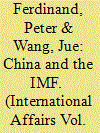

|
|
|
|
|
| Publication |
2013.
|
| Summary/Abstract |
The International Monetary Fund was the international financial institution that was most alien to the Chinese government when it embarked upon its economic reforms at the end of the 1970s, because financial markets were neglected in China's centralized plan. Therefore, China's increasing cooperation with the IMF illuminates the extent to which China has changed through 'socialization' into the norms of global governance more generally.
The article examines the evolution of China's involvement with the IMF and argues that in many respects it has embraced those norms. Even though its political economy still substantially diverges from western prescriptions, many features are compatible with the (original) 'Washington Consensus'.
But China remains wary of becoming too dependent on possible IMF assistance; it tries to preserve its freedom of manoeuvre. Although the IMF has attempted to acknowledge China's growing global importance by increasing its voting rights, this has failed to keep pace with change in the global economy. China is thus attracted by the possibility of additional ways of pragmatically increasing its leverage over global decisions, for instance through regional financial cooperation in Asia.
|
|
|
|
|
|
|
|
|
|
|
|
|
|
|
|
| 4 |
ID:
123987
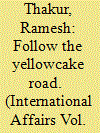

|
|
|
|
|
| Publication |
2013.
|
| Summary/Abstract |
The question of whether Australia should change government policy to permit the export of uranium to India has divided Australians, arms control advocates and scholars. This article does not take a position for or against Australia's export of uranium to India. Instead, it argues that the concept of 'the national interest' is misleading as the analytical framework for assessing this important foreign policy decision, and leads to a distorted analysis and policy prescription.
It is not all that difficult for the government to justify a decision to sell uranium to India as being in the national interest. But a more nuanced and complicated analysis results when the issue is discussed using a novel analytical framework of 'a balance of interests'. 'The national interest' is erroneous as a description of the empirical reality, substitutes tautology for explanation and is unhelpful as a guide to policy.
'A balance of interests' is superior on all three counts of description, explanation and prescription. In addition, it captures human agency and allows for human error and multiple balances as weighed by different people reflecting their personal predilections, professional backgrounds, life and career experiences, party philosophy, and institutional interests and perspectives.
|
|
|
|
|
|
|
|
|
|
|
|
|
|
|
|
| 5 |
ID:
123989
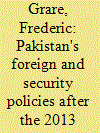

|
|
|
|
|
| Publication |
2013.
|
| Summary/Abstract |
This article examines the consequences of Nawaz Sharif's electoral victory in Pakistan's 2013 general election on the country's foreign and security policies. It analyses the relationships the new government is likely to entertain with the military institutions and the judiciary, and tries to identify the potential vulnerabilities of the new authorities.
It concludes that the security situation will improve marginally, at best, and that a relatively smooth working relationship with the US, dictated by the constraints of the US withdrawal from Afghanistan, can be anticipated.
Relations with India are likely to constitute the real test of the political freedom enjoyed by Prime Minister Nawaz Sharif vis-à-vis the military. The difficulty will be to calibrate the relationship to avoid provoking a backlash with the military.
|
|
|
|
|
|
|
|
|
|
|
|
|
|
|
|
| 6 |
ID:
123988
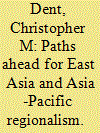

|
|
|
|
|
| Publication |
2013.
|
| Summary/Abstract |
East Asia and the Asia-Pacific are core components of the global economy, and there have been important recent developments in the regionalism of both regions. After the 1997-1998 financial crisis, East Asian countries initiated more exclusive regional cooperation and integration ventures mainly through ASEAN Plus Three, but lately this process has stumbled. The Asia-Pacific Economic Cooperation (APEC) forum has also failed to make substantial progress.
Attention has instead increasingly turned to free trade agreements (FTAs), yet these have hitherto been overwhelmingly bilateral in nature. There are still only a few truly regional FTAs in East Asia and the Asia-Pacific - and these are on a sub-regional scale. However, various frustrations over the messy and fractious pattern of heterogeneous bilateral agreements led to the recent initiation of 'grand regional' FTA talks.
The Trans-Pacific Partnership (TPP) is an Asia-Pacific-based, United States-led project while the Regional Comprehensive Economic Partnership (RCEP) is an East Asia-centred project. Each contains highly diverse memberships and the successful conclusion of TPP and RCEP talks is not assured.
It is argued that, if negotiated, the RCEP is more likely to advance meaningful and effective regionalism than the TPP due to the former ascribing more importance to regional community-building. Furthermore, bilateral FTAs already in force may over the long term transform into more comprehensive economic agreements that address new regional and global challenges such as energy security and climate change.
|
|
|
|
|
|
|
|
|
|
|
|
|
|
|
|
| 7 |
ID:
123980
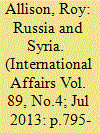

|
|
|
|
|
| Publication |
2013.
|
| Summary/Abstract |
This article explores explanations of Russia's unyielding alignment with the Syrian regime of Bashar al-Assad since the Syrian crisis erupted in the spring of 2011.
Russia has provided a diplomatic shield for Damascus in the UN Security Council and has continued to supply it with modern arms. Putin's resistance to any scenario of western-led intervention in Syria, on the model of the Libya campaign, in itself does not explain Russian policy. For this we need to analyse underlying Russian motives. The article argues that identity or solidarity between the Soviet Union/Russia and Syria has exerted little real influence, besides leaving some strategic nostalgia among Russian security policy-makers. Russian material interests in Syria are also overstated, although Russia still hopes to entrench itself in the regional politics of the Middle East.
Of more significance is the potential impact of the Syria crisis on the domestic political order of the Russian state. First, the nexus between regional spillover from Syria, Islamist networks and insurgency in the North Caucasus is a cause of concern-although the risk of 'blowback' to Russia is exaggerated. Second, Moscow rejects calls for the departure of Assad as another case of the western community imposing standards of political legitimacy on a 'sovereign state' to enforce regime change, with future implications for Russia or other authoritarian members of the Commonwealth of Independent States.
Russia may try to enshrine its influence in the Middle East through a peace process for Syria, but if Syria descends further into chaos western states may be able to achieve no more in practice than emergency coordination with Russia.
|
|
|
|
|
|
|
|
|
|
|
|
|
|
|
|
| 8 |
ID:
123981


|
|
|
|
|
| Publication |
2013.
|
| Summary/Abstract |
The United States intervention in Afghanistan since 2001 has brought progress in some areas, but the conflict has expanded, the Taliban remains powerful, and misgovernance and predation are widespread. Afghan national security forces - the linchpin of the coalition's exit strategy - offer no guarantee of future stability.
Many accounts describe the mistakes that led to this predicament. This article attempts to explain why these mistakes were made by examining their underlying or structural causes. Based on 51 interviews with officials and experts, it identifies major US policy-making errors with respect to state-building, military activities and diplomacy. It argues that there are four principal underlying causes of such errors, relating to organizations, leadership and strategic thinking, psychology, and domestic politics.
It finds that there were severe shortcomings in the acquisition and processing of information and a lack of institutional self-evaluation; civilian and military leaders made major strategic misjudgements in mistaking the strategy for the goal, overestimating the efficacy of military force or resources, and drawing false lessons from history or analogous cases such as Iraq; leaders were predisposed to overconfidence and oversimplification; and, at the highest level, policies were distorted by domestic politics.
The article contends that the cumulative impact of these shortcomings was sufficient to seriously disrupt the functioning of the foreign policy-making system. It argues that action is required to improve US information gathering and assessment, systematize institutional self-evaluation, build regional expertise, establish mechanisms to understand the motivations and perceptions of other actors, and increase awareness of decision-makers' cognitive flaws and biases.
|
|
|
|
|
|
|
|
|
|
|
|
|
|
|
|
| 9 |
ID:
123982
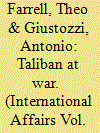

|
|
|
|
|
| Publication |
2013.
|
| Summary/Abstract |
In seeking to explain why and how the war in Afghanistan has dragged on, most analysis has focused on the western and Afghan government effort. This article examines how the war looks from the perspective of the insurgency. Using Helmand province as a case-study, the authors draw on a large number of original interviews with Taliban field commanders and fighters to produce a uniquely detailed picture of the Taliban at war.
In the first section, the article explores how the Taliban returned to Helmand from 2004 to 2006, and show how the British made the situation far worse when they deployed forces to Helmand in 2006. In the second part of the article the authors examine the evolution of the Taliban insurgency in Helmand since 2006. They show how the Taliban has developed an increasingly centralized organizational structure, a more militarized shadow government and greater professionalism of field units.
The overall picture that emerges is of a resilient insurgency that has adapted under immense military pressure. The Taliban have suffered very heavy attrition in Helmand, but they are far from defeated.
|
|
|
|
|
|
|
|
|
|
|
|
|
|
|
|
| 10 |
ID:
123983


|
|
|
|
|
| Publication |
2013.
|
| Summary/Abstract |
Though widely used by academics and policy-makers in the context of the 'war on terror', the concept of radicalization lacks clarity. This article shows that while radicalization is not a myth, its meaning is ambiguous and the major controversies and debates that have sprung from it are linked to the same inherent ambiguity.
The principal conceptual fault-line is between notions of radicalization that emphasize extremist beliefs ('cognitive radicalization') and those that focus on extremist behavior ('behavioural radicalization'). This ambiguity explains the differences between definitions of radicalization; it has driven the scholarly debate, which has revolved around the relationship between cognition and behavior; and it provides the backdrop for strikingly different policy approaches - loosely labeled 'European' and 'Anglo-Saxon' - which the article delineates and discusses in depth.
Rather than denying its validity, the article calls on scholars and policy-makers to work harder to understand and embrace a concept which, though ambiguous, is likely to dominate research and policy agendas for years to come.
|
|
|
|
|
|
|
|
|
|
|
|
|
|
|
|
|
|
|
|
|